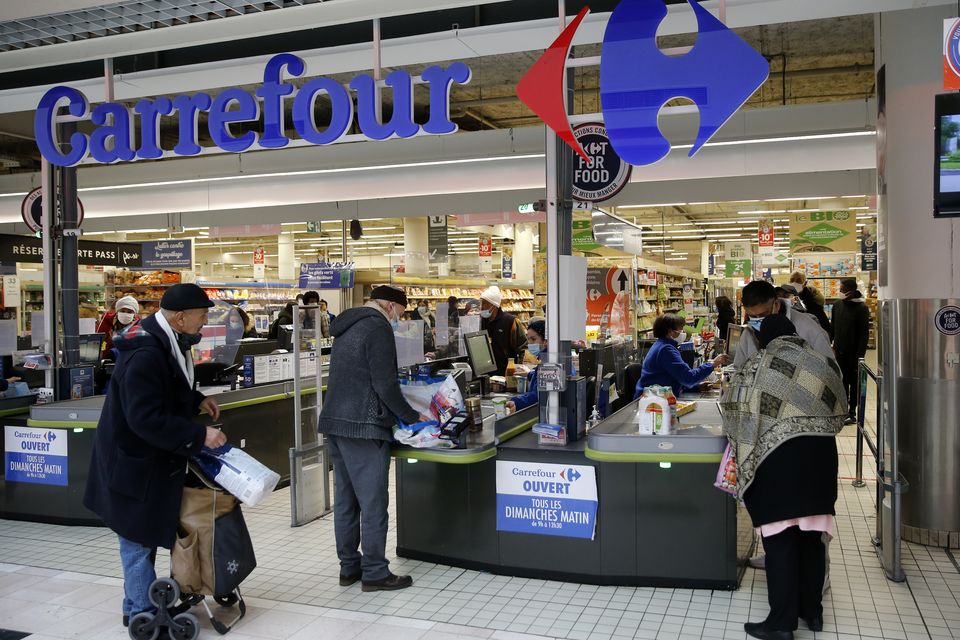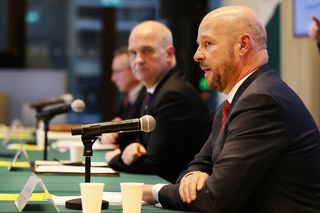Retailers should be forced to warn shoppers about shrinkflation on shelves, says watchdog
French supermarket chain Carrefour voluntarily put price warnings on some items last September. Photo: Getty
The Government has been urged to follow the French lead and force retailers to notify shoppers when products have been reduced in size without a corresponding cut in prices.
The French move is an attempt to tackle so-called “shrinkflation”, which has been described as a rip-off.
Shrinkflation has become a headache for consumers and governments as households struggle to cope with dwindling purchasing power in the face of a cost-of-living crisis.
Since March, Hungary’s government has required large food retailers to display price warnings on products that have been made smaller.
In France, retailers will soon have to notify shoppers when products had been reduced in size without a corresponding cut in prices, the finance ministry said.
From July, French retailers will have to display for two months when food and other common consumer goods products such as detergent have been downsized in a way that causes the unit price to go up.
“Shrinkflation is a rip-off, we’re putting an end to it. I want to rebuild consumers’ confidence and confidence goes hand in hand with transparency,” France’s finance minister Bruno Le Maire said.
France is urging other EU countries to impose similar rules.
French supermarket chain Carrefour voluntarily slapped price warnings on some products last September to put pressure on big consumer goods producers such as Nestle, PepsiCo and Unilever before annual price negotiations.
Now, Michael Kilcoyne, chairman of the Consumers’ Association of Ireland, said Ireland should do the same and require retail outlets to put notices on goods that had been reduced in size without a cut in the price.
Mr Kilcoyne said shrinkflation was a huge issue as manufacturers and retailers sought to maintain their profit margins during a cost-of-living crisis.
Read more
He said shrinkflation was a back-door way for manufacturers to hike prices.
“Shrinkflation is sneaky and consumers need to be informed when it is happening,” Mr Kilcoyne said.
He said it was not fair that consumers were forced to pay more for less when they shopped.
Grocery prices continue to rise, but inflation figures are not measuring the impact of shrinkflation.
The latest “flash” estimate of inflation from the Central Statistics Office (CSO) shows that the annual rate slowed to 1.6pc in the year to April, from a rate of 1.7pc in the year to March.
Food prices are estimated to have gone up by 0.6pc in the last month and risen by 2.6pc compared with April last year.
However, when asked, the CSO said its inflation figures did not fully capture the impact of shrinkflation in this country.
Anthony Dawson, a statistician in the prices division, said the CSO did try to measure the impact of shrinkflation, but its model was not fully developed to capture where packet sizes were being reduced while prices stayed the same or went up.
US president Joe Biden recently attacked manufacturers engaged in shrinkflation.
“Too many corporations raise prices to pad the profits, charging more and more for less and less,” he said.
Mr Biden backed a bill by Democratic senator Bob Casey that would give more policing power to the US Federal Trade Commission and state attorneys general to tackle shrinkflation.
Join the Irish Independent WhatsApp channel
Stay up to date with all the latest news















